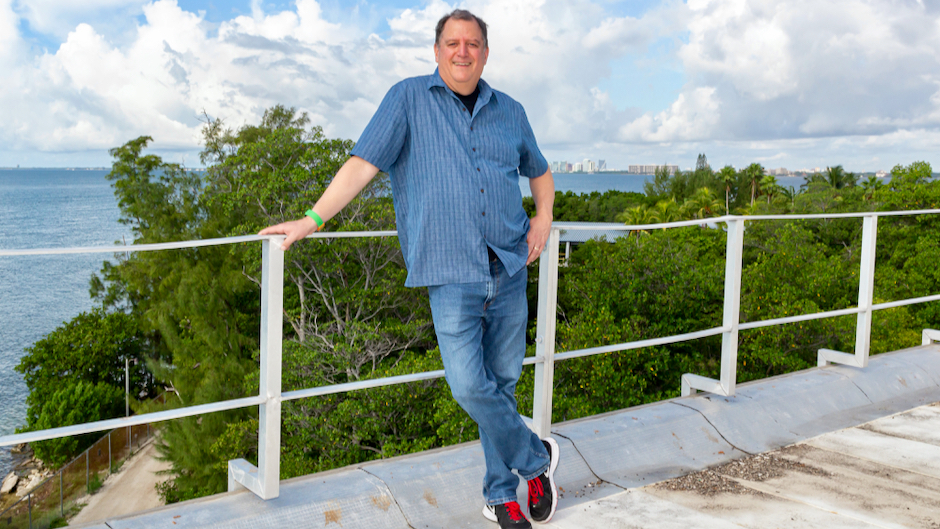Heat waves, flooding and wildfires. As the climate warms, Americans must learn to live with these extremes.
But that doesn’t make them any less frightening or dangerous.
And planning for them can help save lives and property.
That is why professor Ben Kirtman is working to find ways to make digital prediction tools more accurate and local, so that officials at the city and county level can prepare with advance warning before their communities are hit with any of these extreme weather events.
This summer, Kirtman, a professor of atmospheric sciences and the William R. Middelthon, III Chair of Earth Sciences at the Rosenstiel School of Marine, Atmospheric, and Earth Science, received a trio of grants totaling more than $3 million from the National Science Foundation and the National Oceanic and Atmospheric Administration (NOAA). This funding will allow him to collaborate with Rosenstiel colleagues and his former students across the country to further understand and predict the impacts of the meteorological phenomenon known as “El Niño.” This information will help forecasters to prepare advance warnings about flooding, heat waves and wildfires.
Temperature and Precipitation/El Niño
The El Niño Southern Oscillation (ENSO) is a climate phenomenon that has a dramatic impact on rainfall, temperature, and wind across the world. The latest El Niño started in June 2023, and is expected to last until March 2024. The climate pattern is recognized by warmer sea surface waters in the Pacific Ocean that shift east along the equator. This coincides with a decrease in air pressure over the Pacific Ocean, weakening trade winds. As a result, an El Niño usually triggers a colder, drier winter for the northern United States, but the southern half of the country experiences a winter with more precipitation. It also exacerbates heat waves, and makes oceans hotter, which is harmful for marine life.
Working with Rosenstiel alumna Sarah Larson—now a climate scientist at North Carolina State University—Kirtman will study some of the remaining unknowns for predicting an El Niño, which typically occurs about every two to seven years.
Researchers are confident they can predict whether El Niño will be active in the upcoming year, but they still can’t predict the intensity of the phenomenon. To do so, they will study the strength of the buildup of hot waters in the Pacific, known as “preconditioning,” and other global weather patterns that influence El Niño.
Kirtman thinks this work can help people across the world prepare for an El Niño, which often brings with it drastic changes in temperature and impacts a variety of things like fish migration, for example.
“By providing the best available intensity forecast for an El Niño season, we can equip stakeholders with the ability to plan for the impacts well in advance,” said Kirtman, who also directs the Cooperative Institute of Marine and Atmospheric Studies, a collaboration with NOAA and 10 partner universities, which addresses issues of national interest within the context of NOAA’s missions of environmental prediction and stewardship. Kirtman is also the deputy director of the Frost Institute for Data Science and Computing.
Kirtman received a $1.5 million grant to improve these forecast tools.
Wildfires
Another grant aims to improve upon forecasts that first responders in California rely on to prepare for and respond to wildfires. With more than 7,000 wildfires burning more than 331,000 acres in 2022, according to the California Department of Forestry and Fire Protection, the information is needed quickly. Currently, first responders rely on generic, short-term weather forecasts and basic prediction tools like the Hot Dry Windy Index (HDWI) that are erratic and can only predict weather conditions for up to two weeks.
Through this study, Kirtman and Samantha Kramer, a Rosenstiel alumna who is now an air quality data scientist at Sonoma Technology, Inc., in San Francisco, were awarded $822,456 by NOAA, to improve and extend those forecasts throughout an entire wildfire season. To do this, they will utilize tools Kirtman has developed to measure El Niño, but will also incorporate a variety of predictive data like wind, humidity, soil moisture, precipitation and temperature.
Kirtman and Kramer will also meet regularly with federal and state emergency officials to tailor the research to their needs.
“We plan to work closely with meteorologists from the U.S. Forest Service to formulate improved forecasts,” said Kirtman. “Understanding how they need to use the forecast is going to drive how the science is developed, so they will have a more comprehensive picture of the methodology and have enhanced confidence in using the forecast to make the best decisions.”
Kirtman was awarded $822,456 for this project.
Flooding
Another grant will focus on coastal flooding along the East Coast of the U.S. The goal of this NOAA-funded study is to provide local communities with detailed, daily, and long-term flood predictions, not just when a hurricane is approaching.
This project also has a connection to El Niño. Although people can easily understand how the Pacific Coast is affected by El Niño (formally known as El Niño–Southern Oscillation, or ENSO) since the weather phenomenon originates deep in the Pacific Ocean. But Kirtman wants to show how it also affects global weather patterns so drastically that it affects coastal, everyday flooding that occurs in places like Charleston, South Carolina.
“When you watch your weather forecast on TV, things are going to start to evolve,” Kirtman said. “They’re going to not only talk about how hot and humid and chances of rain, they’re going to start talking about, ‘What’s the flood forecast for this coming week?’ This is the kind of research that will inform that.”
Kirtman was awarded $750,000 for this project, which he will conduct with Rosenstiel researchers Emily Becker, Brian Soden, and Brian McNoldy.

